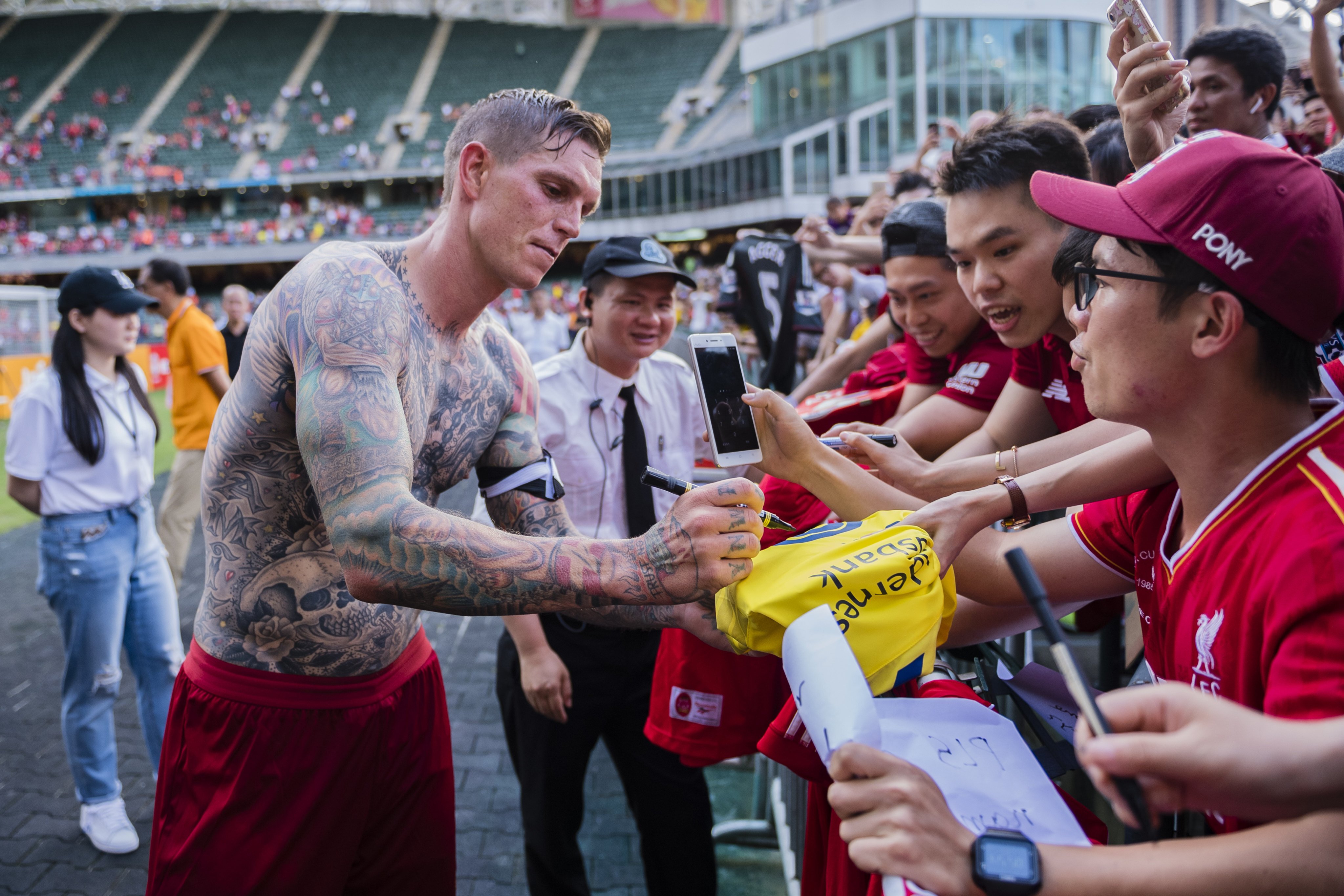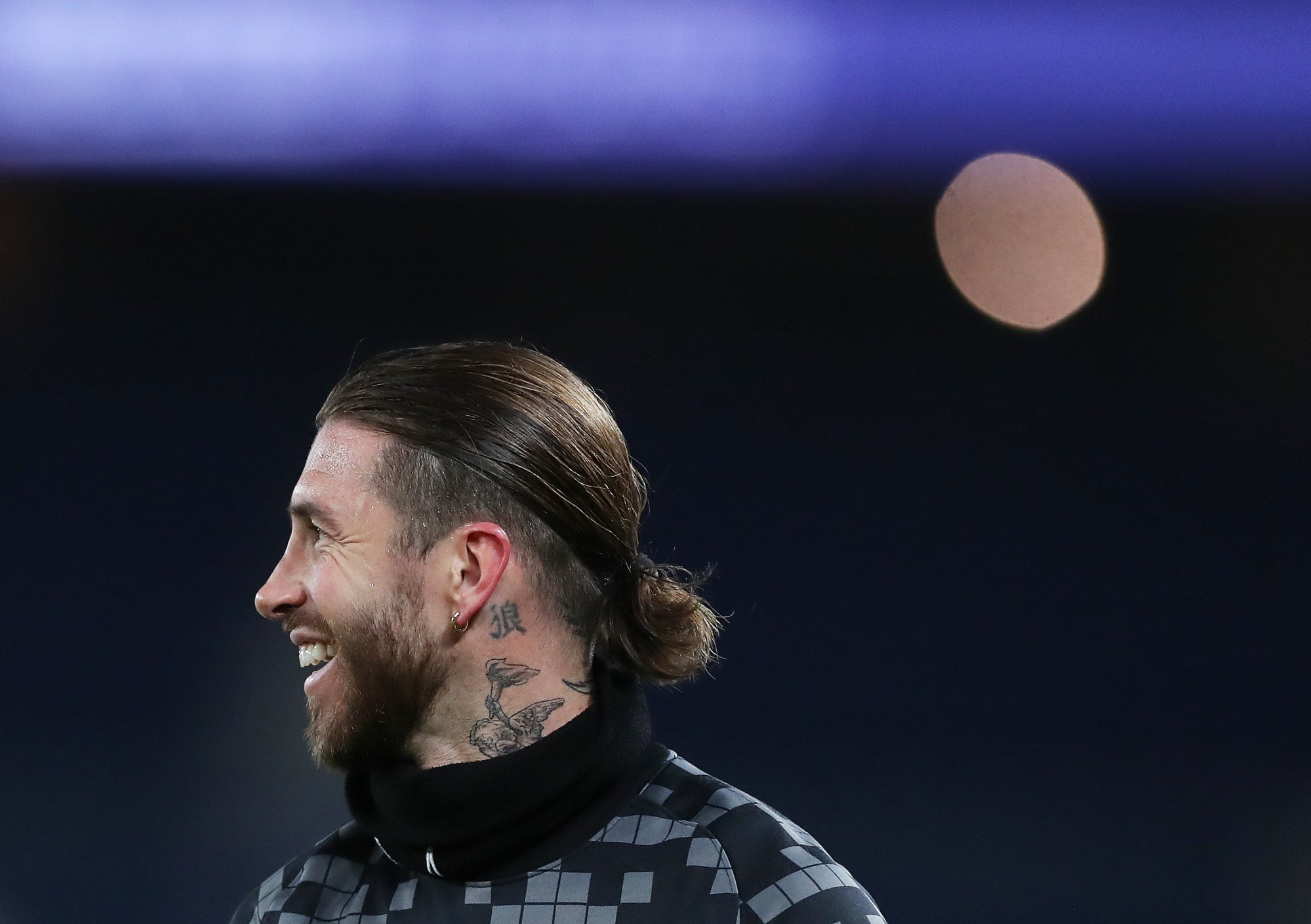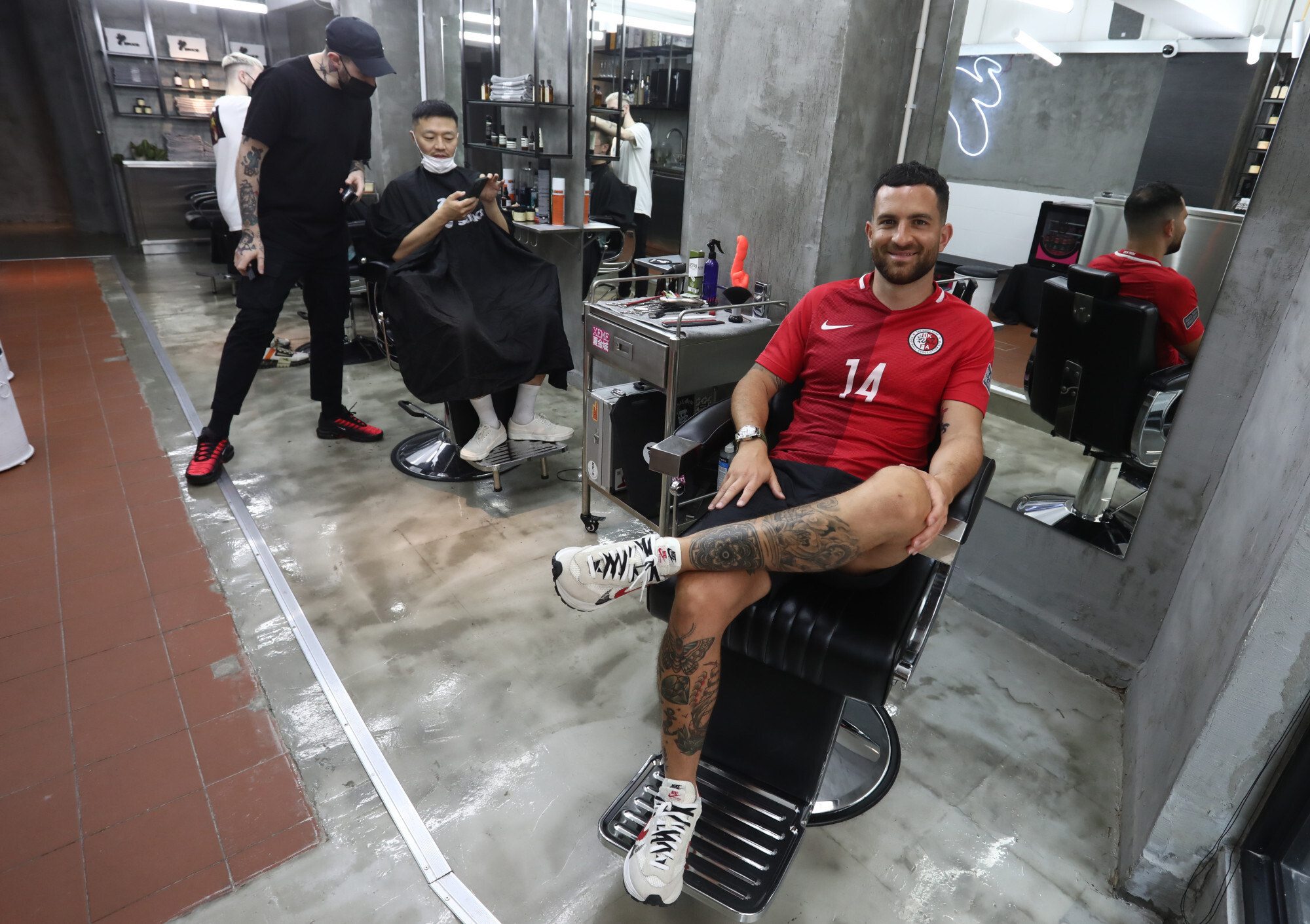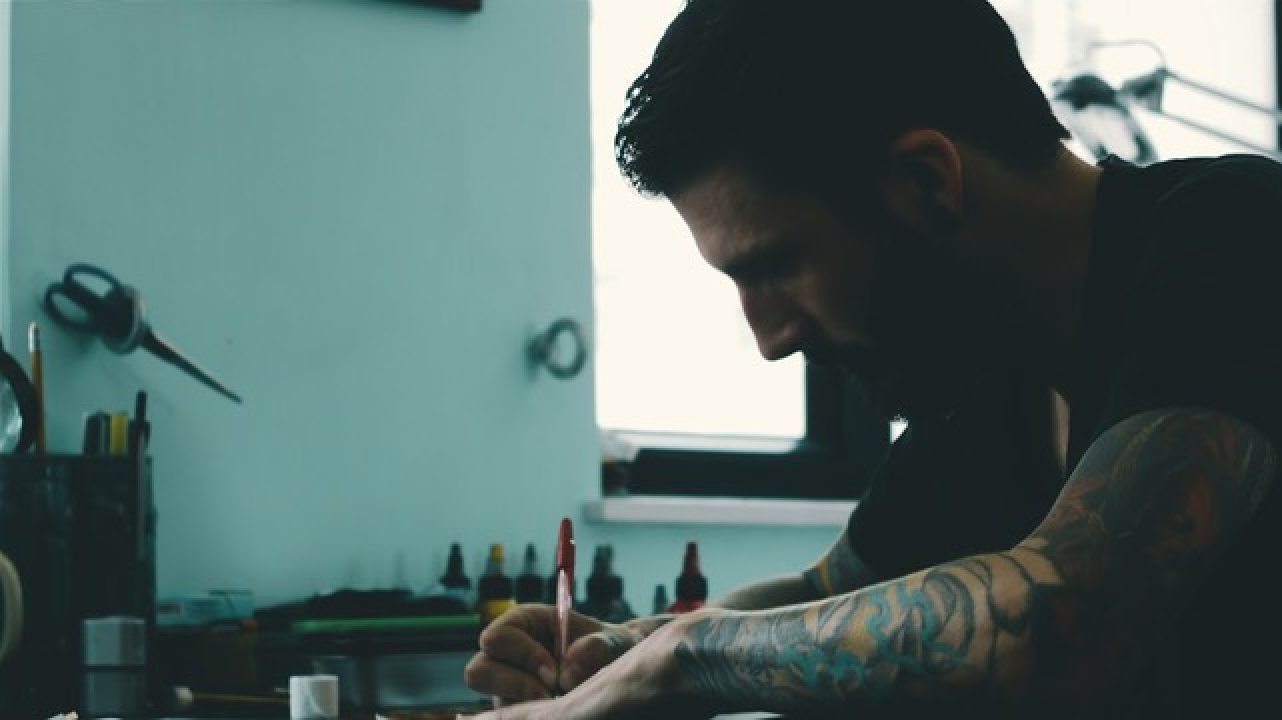
- Football has long embraced tattoos, dating back to England’s David Beckham bringing the art into the cultural mainstream
- However China appears to want to stop this movement, with the debate acting as a microcosm for its societal changes
When it comes to football players in 2022, the question isn’t how many have tattoos, it’s who doesn’t.
Cristiano Ronaldo is the most famous holdout, however the likes of Lionel Messi, Neymar, Sergio Ramos, Zlatan Ibrahimovic and Kylian Mbappé – just to name a few – all have serious ink.
“The tattoo ban is mostly about national image,” Christopher Rea, who works in the department of Asian Studies at the University of British Columbia, said. “The Chinese government wants a clean, wholesome, uniform look for the team that will be representing the nation.”
Rea added this announcement fits into the Communist Party’s recent common prosperity push and cultural crackdown led by President Xi Jinping which stretches across multiple sectors, industries and facets of mainland society.

“Expressions of individuality and personality are not welcome,” he said, “unless they have to do with bending a ball into a goal. Emulation is the government’s other worry, that every impressionable young man in China will want to get cool tattoos like Zhang Linpeng.”
However it’s tough to fault Chinese players like Zhang (who has two full sleeves and tattoos on his neck) for following a cultural revolution on the pitch that first got global attention with England’s David Beckham. The retired football superstar has become a cultural icon off the pitch for his fashion sense, and also broke barriers when it comes to ink.
How Han Chinese came to associate tattoos with criminality
The celebrity midfielder first caught the attention of the international press in 1999 when he was photographed sporting a tattoo with the name of his first son Brooklyn on his lower back. This was followed by his wife Victoria’s name in Hindi on his forearm, and while Beckham received heavy scrutiny in the early 2000s for his tattoos, ink in football and modern culture soon became more widespread and is now commonplace.
Hong Kong’s Jack Sealy, who got his first cap for the city in 2011, and has multiple tattoos, said the Englishman paved the way for others to follow his lead.
“Beckham definitely normalised tattoos and I don’t see an issue with it,” said Sealy, who plays in the Hong Kong Premier League and runs a barbershop called Sauce in Central. “One thing that does tend to happen is young players think that being a footballer and having tattoos go hand in hand, and therefore think that as soon as they sign a contract, they have to get a tattoo to fit the image.”
Modern culture has gone far enough in 2022 that not having tattoos is almost more noticeable than having them now, Sealy added.

“So where tattoos used to be quite an individual statement thing, it’s almost more of a statement not to have tattoos in football, especially in European leagues and places outside of Asia.”
Sealy said he’s never had problems with his ink in a professional capacity (having travelled to multiple countries for Hong Kong), however noted his are fairly easy to hide if needed given they are mostly on his legs.
“I was a little worried one time when I was going to Thailand though, as I think it’s illegal for foreigners to have a Buddha tattoo due to cultural insensitivities,” Sealy, who has the Lantau Buddha tattooed on his leg, said. “Thankfully I didn’t get stopped, but I was worried for a second.”
Hong Kong has had a long history with tattoos, dating back to the 1940s when the first shop opened officially in the city. Previously a British colony, tattoos have long been a common sight in the region because of the British and US navy, however local stigma has thawed much slower because of traditional Asian cultural norms.
Remove your tattoos, Beijing tells Chinese football players
Rob Kelly, who has been a licensed tattoo artist in Hong Kong dating back to 2006 and runs Blackout Tattoo in Sheung Wan, said he has seen the city undergo a massive cultural shift when it comes to tattoos within that time frame.
“Back when I started tattooing is right around when I would consider the shift in acceptance of tattoos started happening,” Kelly said. “Prior to 2005 tattoos were mostly seen as a negative thing. In Hong Kong, traditionally speaking, tattoos were not seen on the streets much. If you did see them they were either on foreign sailors who collected souvenirs of their travels, or you would see them on local gangsters.”
Kelly said Jimmy Ho and Ricky and Pinky were two groundbreaking shops with artists who helped normalise the art and bring it into the modern era. He also credits Western culture as having a huge impact on people’s acceptance when it comes to ink.
This was largely because of the success of Miami Ink, a TLC reality television show that first aired in 2005 about a tattoo shop in the American city which starred Kat Von D, among others. The show ran for four seasons and also spawned a number of spin-offs.

“Miami Ink opened up tattooing to the world,” Kelly, who got his first tattoo when he was 14, said. “What was once almost a secret, underground thing was now out for all to see. The show put it out there that you didn’t have to be a criminal or a sailor to get a tattoo. There were soccer mums, doctors, students all telling their stories about why they wanted what they were getting. It humanised the tattoos and seriously took off.”
While tattoos have now become so mainstream that both soccer players and soccer mums have ink, it appears the Chinese want to return to more traditional stylings, culturally speaking, Rea said.
“The directive is also consistent with other recent Chinese government impositions on free expression by celebrities, such as its ban of ‘sissy’ men in broadcast media, which specifically target bodies,” Rea said. “‘Sissy’ men and tattooed footballers represent two ends of a spectrum of masculinity, and the PRC government wants everyone to follow a conformist middle path. When you are a public figure in China, your body is not your own.”
William Jankowiak, the co-director of the University of Nevada, Las Vegas’ Asian and Asian-American Studies programme said this directive dates back decades and signals the government’s intent to revert to past expectations when it comes to its citizens.

“It is part of the single child individualistic culture,” Jankowiak said. “In the 1980s, few people – only the outcaste – got a tattoo. Now many people do, and tattoo parlours are all over urban China. It no longer carries the outcaste image, maybe an independent or daring creative image. The government’s return to cultural conservatism is a return to pre-reform era morality and cultural style and thus they want to recast the tattoo as an outcaste image.”
Sealy said this clearly goes against modern Western cultures around the planet helping shift narratives about people who have ink.
“I think tattoos are becoming a lot more accepted around the world,” he said. “They used to be a sign of gangs, or criminals, but now they’ve become a fashion statement and can be very tasteful. A lot of companies are more relaxed with their view on tattoos, and global icons like David Beckham and helped pave the way for the normalisation of tattoos.
“I remember when I was much younger I used to think if I saw someone with a tattoo it meant they’d been to prison, but now hopefully if people see me with mine, they don’t have any preconceived judgments.”

“Tattoos are part of your motivation in football,” Valdo said. “It makes you feel happy because having a tattoo is like part of the game of football. And it has a very personal explanation, and it depends on each individual, but for me having tattoos is a very personal thing because it’s part of my body and I can’t take it off.”
However it appears tattoos in football, in Asia in particular, have now become politically charged again. A number of professional footballers, in Hong Kong and Asia, were contacted by the Post for this article, however they all declined to comment on the subject because of personal concerns and didn’t even feel comfortable commenting anonymously.

Kelly said there is clearly a divide between where youth culture is headed, and where China wants to go with its youth. He said Hong Kong is a great representation of this because of its unique ability to straddle both Eastern and Western cultures simultaneously.
“Culturally in Hong Kong there have been great leaps with regard to liberal thinking and standing out,” Kelly said. “There’s a greater acceptance of everything among the youth here. I don’t know whether you can attribute that to TV, or most likely the internet, but you can see it. Just look at the current climate. Hong Kong people are unique, and they like it that way.
“Free access to information is definitely something China proper doesn’t have. That you are seeing tattoos banned in sport in China is symptomatic of a larger movement to ban anything liberal, or different. I think the CCP is trying to homogenise everything and redefine what being Chinese means. Whether that be a good patriotic member of society, or not a ‘sissy man’. You’re seeing purges of celebrity culture, of excess, of flaunting of wealth and of anything deemed to be Western.”

